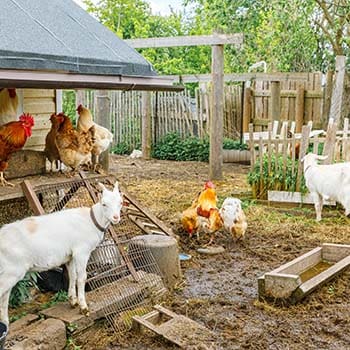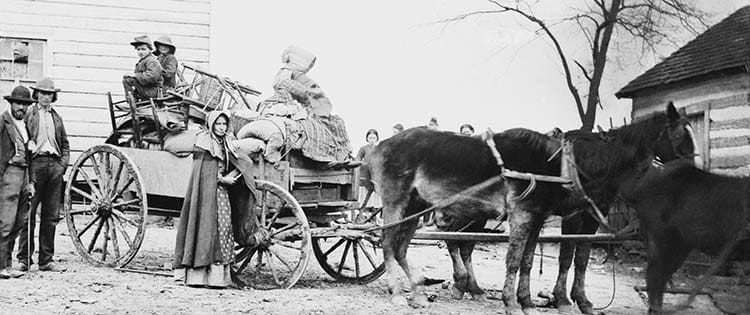The American Civil War (1861-1865) was a very challenging time for all Americans, civilian and military. As the war progressed, and particularly after the blockades, the movement of food and goods between the North and South became seriously affected.
Both armies and civilians had a hard time getting enough food to eat or getting basic goods. The problem was very acute for the people and army in the south who suffered more than their northern counterparts.
Food became in very short supply, very expensive, and eventually not available at all. People had to find other means to feed themselves, turning to raising livestock, planting gardens, and foraging for food. At this time people found many substitutes for food items that they could not get.
Medicines were also in short supply, so people had to use medicinal herbs more than they had done in the past. Consumer goods became luxuries that people could not afford, and so they repurposed items and got by with whatever they had.
Some of the skills and strategies people used during this time could very well come in handy today with all the economic uncertainty, food shortages, drug-resistant bacteria, etc.
Raising Livestock, Planting Gardens, And Foraging
Even people in the towns started to keep livestock, especially chickens to help feed their families.
Gardens were planted with quick-growing vegetables such as bush beans, carrots, spinach, etc. A variety of herbs for both culinary and medicinal use were planted to help keep the family healthy.
Local woods were foraged for wild fruits, nuts, berries, greens, duck eggs, snails, snakes, and locusts. Fish could be caught in nearby streams and rivers and small game (pigeon, rabbit, venison) captured with the help of snares and traps.
Food Substitutes
People became very creative in their attempts to find substitutes for food they could no longer get such as sugar where they used honey, molasses, and sorghum instead.
Coffee had many substitutes like roasted acorns and chicory, but the best was said to have been dried okra seeds.
Tea was another scarce commodity that people replaced with herbs, sassafras roots, or the leaves from berries such as raspberry, blackberry, and huckleberry.
Wheat flour was substituted with rice flour, cornmeal, and rye flour. Salt was keenly missed by people in the south as it was a method of preserving meat, so seawater was boiled and even the dirt from a smokehouse floor was processed to get the much-needed salt.
Hardtack
Hardtacks made from wheat flour, salt, and water became a substitute for bread.
It was cheap, nutritious, lightweight, and very long-lasting when stored in the right conditions. Soldiers hated this tough, tooth-breaking food but found ways to make it palatable.
Some boiled it in their coffee to soften it up, and any weevils that floated to the top were easily thrown away.
Another method was to break it up and use it as a thickener in soups or fry it in pork fat as a kind of crouton.
Food Preservation Methods
There were a variety of food preservation methods used in the days of the Civil War including canning, drying, salting, smoking, and pickling.
This meant that any excess of fruit, vegetables, meat, fish, grains, milk, or eggs could be preserved, and these methods could still be used today.
The lifespan of fruit and root vegetables was lengthened by storing them in root cellars where it was cool and dry.
Soldiers received canned food when available along with salted beef or pork, dried vegetables (carrot, onion, celery), and dried beans, in addition to other food items.
Salt was a very important ingredient used in salting, smoking, drying, and pickling preservation methods. Obviously, lots of dry salt was needed to salt meat or fish which would then last for years, but it was also used in the drying and smoking of meat.
Meat for drying was cut into thin strips, dipped in salt, and then hung to dry. Meat or fish for smoking would be treated in a brine solution before being placed over the fire in a smokehouse.
Vegetables and other foods would be pickled in a salt brine with vinegar or herbs added for extra flavor and sealed in airtight containers.
Medicinal Herbs And Plants
The blockades stopped medicines from reaching people in the south, so doctors resorted to traditional plant remedies that were already known to southerners.
A whole array of herbs, roots, and bark were used to treat a wide variety of illnesses and diseases.
For example, fevers could be successfully treated as well as stopping wounds from becoming infected. These were mostly used topically as hot/cold compresses and poultices.
Lots of roots and bark have antiseptic and antimicrobial properties that could certainly help today with the spread of drug-resistant bacteria.
Repurposing Old Items And Making Your Own
Times were really hard, especially for Southerners. They needed to repurpose old items or make their own things.
Fabrics from old clothes were sewn to make new garments, and carpets were cut up to serve as blankets.
A paper shortage meant people tore up old accounting books or stripped walls of their wallpaper to use as paper.
Buffalo chips (flat, dried buffalo poop) were burnt as fuel when no wood was available. As new shoes became a luxury, people made their own shoes from animal hides.
Farm women could spin cotton or wool to make yarn that could be knitted or woven into garments. Soldiers even punctured their canteens to grate dried corn when there was no cornmeal available.
Protecting The Home
With many of the men away from home, women trained themselves in how to use weapons. In fact, anything that came to hand was used to defend life and property such as pitchforks, hatchets, knives, and rifles.
Some even formed groups to help protect each other from intruders. Another strategy was to hide valuables and wear two sets of clothes so they would have a spare set of clothes if they needed to run away.
These survival hacks from the Civil War are just as applicable today as they were then. Many of these skills of raising livestock, growing vegetables, foraging, and food preservation are vital in today’s uncertain world.
Utilizing medicinal herbs and plants can help combat the deadly drug-resistant bacteria that threaten our lives today. Repurposing is not only necessary, and economical, but it also helps to save the environment.
This article first appeared here.
You may also like:
The Forager’s Guide To Wild Foods: Book Review
This Homemade Device Can Power Up Your Entire House 7 Days in a Row (Video)









